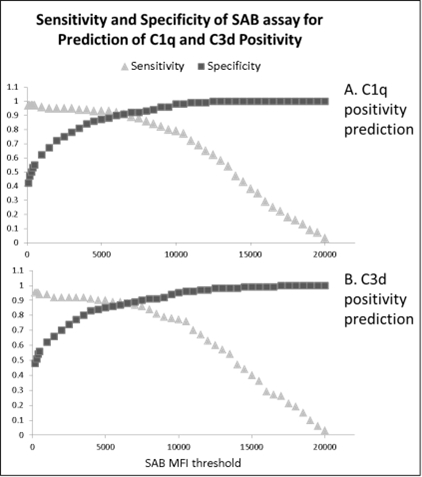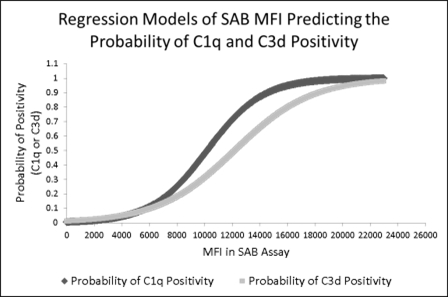Predicting the Ability of Anti-HLA Antibodies to Activate Complement.
University of Toledo, Toledo.
Meeting: 2016 American Transplant Congress
Abstract number: D2
Keywords: HLA antibodies, Kidney transplantation, Screening, Waiting lists
Session Information
Session Name: Poster Session D: Antibody Mediated Rejection: Session #2
Session Type: Poster Session
Date: Tuesday, June 14, 2016
Session Time: 6:00pm-7:00pm
 Presentation Time: 6:00pm-7:00pm
Presentation Time: 6:00pm-7:00pm
Location: Halls C&D
Purpose: The single antigen bead (SAB) assay measures binding of antibodies (Abs) to HLA in units of mean florescence intensity (MFI). Two assays measure the potential of Abs for complement activation by testing C1q or C3d deposition. We examined whether SAB MFI correlates with C1q or C3d positivity.
Methods: Sera of 17 patients (PRA>80%) were analyzed for anti-HLA-I Abs in SAB, C1q, and C3d assays using sera neat or diluted 1:4 or 1:64; an MFI of 1000 was considered positive in C1q and positivity in C3d was determined by MatchIT. For the predictive performance of SAB, receiver-operating characteristics (ROC) and logistic regression modeling were done; statistical significance was assessed by Wald's test.
Results: The sensitivity and specificity of SAB for prediction of C1q positivity were both equal to 0.91 at 6,500 MFI. Thus, 91% of the time, a bead is C1q positive if it has an SAB MFI of 6,500 or higher. An SAB MFI cutoff of 6,500 yields an area under the curve (AUC) of 0.95 in ROC analysis. The optimal MFI cutoff was also at 6,500 for C3d positivity, yielding sensitivity and specificity of 0.88 and an AUC of 0.91 (Fig. 1). Logistic regression predicts dichotomous outcomes for C1q and C3d based on SAB MFI. In particular, the probability of SAB+ Abs for beads with MFI over 20,000 to be C1q or C3d positive was 99.3% and 79.9%, respectively. In contrast, at MFI of 1,000 the probability dropped to 1.0% for C1q and 1.7% for C3d (Fig. 2). Wald's test confirmed significant reliability.
Conclusion: Statistical analyses of titrated sera for highly sensitized patients indicate that SAB MFI results correlate with C1q and C3d results. These analyses indicate good diagnostic accuracy for C1q and C3d assays. Finally, SAB MFI predicts the cytotoxic potential of HLA-specific Abs.


CITATION INFORMATION: Bekbolsynov D, Baum C, Mierzejewska B, Malebari A, Rees M, Stepkowski S. Predicting the Ability of Anti-HLA Antibodies to Activate Complement. Am J Transplant. 2016;16 (suppl 3).
To cite this abstract in AMA style:
Bekbolsynov D, Baum C, Mierzejewska B, Malebari A, Rees M, Stepkowski S. Predicting the Ability of Anti-HLA Antibodies to Activate Complement. [abstract]. Am J Transplant. 2016; 16 (suppl 3). https://atcmeetingabstracts.com/abstract/predicting-the-ability-of-anti-hla-antibodies-to-activate-complement/. Accessed February 18, 2026.« Back to 2016 American Transplant Congress
